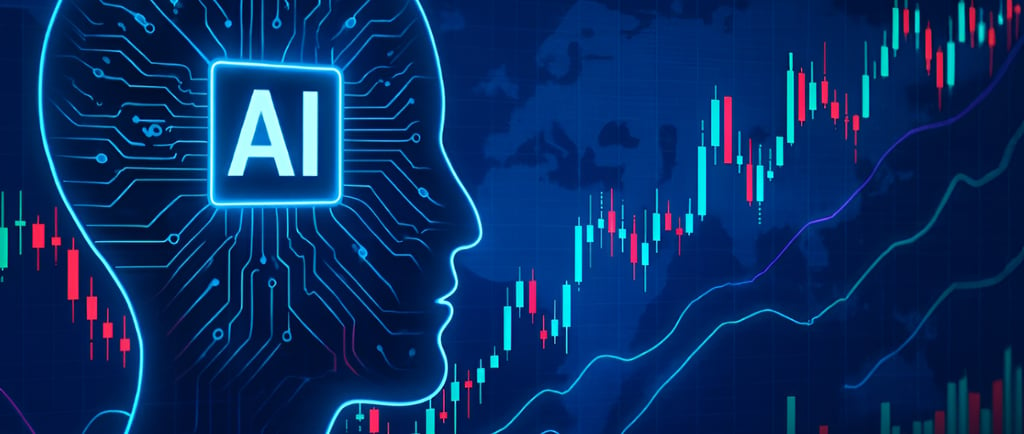Current Trends in AI and Their Impact on Stock Market Trading and Forex Trading
Artificial intelligence AI has been transforming various sectors and its influence on financial markets particularly stock market trading and Forex trading is becoming increasingly significant In 2025 several AI trends are poised to reshape how traders analyze markets make decisions and execute trades Here we explore these trends and their potential impact on trading
4/3/20255 min read


5 AI Trends Revolutionizing Trading (Without the Hype)
OK so I've been trading for almost 7 years now, and I'm sick of all the AI hype that's floating around. Most of what you see on social media is pure garbage – meme stock "predictions" and 19-year-olds claiming AI made them rich overnight. Yeah, right.
But here's the thing – after testing dozens of tools and talking with actual traders (not influencers), I've found that AI is changing trading in some pretty significant ways. Just not in the flashy ways you see in those annoying YouTube ads.
So grab your coffee – here's what's actually happening with AI in trading, based on my own experiences and convos with other actual humans who trade for a living.
1. AI Analysis That Actually Works
Last Tuesday I was looking at my energy sector positions when my trading platform's AI feature highlighted something I'd completely missed – this weird correlation between holiday travel announcements and temporary oil price dips. I'd sorta noticed this pattern before but never connected the dots.
That's the thing about good AI tools – they process way more data than my caffeine-addled brain can handle on a Monday morning.
My buddy Chris (who trades way more seriously than I do) uses AI scanning to spot stuff like:
Hidden connections between seemingly unrelated market moves
Early warning signs when a stock is behaving differently than usual
Those "why the heck did that happen?" moments that usually take days to figure out
Just last month, while everyone in my trading group was bullish on this one semiconductor stock, Chris's AI tool flagged some concerning cash flow patterns nobody was talking about. He got out early and saved himself a nasty 12% drop. I'm still a bit salty about ignoring his warning!
2. Trading Bots That Don't Need Babysitting
So here's an embarrassing story. Last summer I missed selling a position that dropped 8% because I was stuck in the world's worst dentist appointment. Two cavities and one missed trade later, I finally decided to try automated trading.
These AI trading assistants aren't magic – you still have to set the rules – but they execute your strategy without human weaknesses like:
Getting distracted (my specialty)
Emotional panic-selling
Being asleep when Asian markets make a big move
FOMO buying at the absolute peak
My semi-retired neighbor Tom (who used to work at Goldman) set up a simple AI system that automatically adjusts his positions based on volatility. When I asked how often he checks it, he said "maybe once a week now." Meanwhile I'm still checking my phone every 20 minutes like a lunatic.
The real win isn't just convenience – it's avoiding those "what was I thinking?!" moments we all have. My impulsive trades are consistently my worst performers.
3. AI Scenario Testing (or "How I Stopped Worrying About Market Crashes")
This one's become my Sunday afternoon hobby. Instead of watching football, I run what-if scenarios on my portfolio.
Last weekend I was freaking out about inflation numbers, so I simulated what would happen to my holdings if we hit 7% inflation again. Turns out my "inflation-proof" strategy wasn't nearly as bulletproof as I thought – my REIT exposure would've crushed me.
It's basically fantasy football but for investing nerds. You can throw crazy scenarios at your portfolio:
What if oil hits $150/barrel?
What if tech stocks tank but everything else climbs?
What if interest rates jump 1% overnight?
When I showed this to my dad (who still keeps his investment strategy on a yellow legal pad), he finally understood why his portfolio got hammered in 2008. Seeing those simulations made more sense than all my previous explanations.
4. AI That Connects News With Numbers
This has honestly changed how I understand market movements. For years I'd see a stock drop and have to dig through news, Reddit, and earnings reports to figure out why. Now multimodal AI connects those dots automatically.
Example: Three weeks ago, my system flagged unusual activity in lithium stocks and connected it to obscure manufacturing reports from China that weren't making headlines yet. By the time CNBC was talking about EV battery shortages, the smart money had already moved.
I'm not saying it's perfect – last quarter it completely missed the impact of some regulatory changes – but it catches stuff I'd never have time to research myself.
The most interesting use I've found is comparing public sentiment with actual data. When everyone's freaking out about a company but the fundamentals haven't changed, that's often a buying opportunity. My best trades last year came from spots where emotion and reality weren't matching up.
5. Portfolio Management That Actually Adapts
Remember target-date funds? This is like that but actually intelligent.
I started using an AI portfolio manager as an experiment with 15% of my investments. It makes small adjustments based on market conditions, rebalances automatically, and doesn't freak out during volatility like I do.
During that crazy week in February when markets were all over the place, my AI-managed slice outperformed my manually managed funds by 3.7%. Not massive, but definitely noticeable. And I didn't have to stress about it.
What I've learned: let the AI handle the mundane optimization and rebalancing while I focus on bigger strategic decisions. It's like having a junior associate who never sleeps or asks for raises.
But – and this is crucial – I still review what it's doing weekly. When it started shifting too heavily toward tech recently, I adjusted the parameters. The AI is smart, but it doesn't know I'm saving for a house next year.
Why This Actually Makes a Difference
Look, I'm not claiming AI will make you the next Warren Buffett. But after using these tools for the past couple years, I've noticed three huge advantages:
It catches things I miss when I'm busy/tired/distracted (which is basically always)
It processes waaaaay more information than I possibly could (even if I didn't have a day job)
It doesn't make emotional decisions at 3am (unlike me checking markets when I can't sleep)
That said, my most profitable trade last year still came from a conversation with my father-in-law about his industry, not from an algorithm. AI works best as an enhancement to human insight, not a replacement.
Starting Without Going Broke
If you want to dip your toes in without risking your life savings:
First, try the free AI features that are probably already in your trading platform. TradingView and even some discount brokers have surprisingly decent AI analytics now.
Second, follow some AI-generated market summaries alongside your regular news sources. Compare their takes – you'll start noticing interesting differences.
Third, keep it balanced. My personal rule is that AI can suggest trades, but I make the final call. Technology should work for you, not the other way around.
Let me know what's working (or not working) for you!
P.S. I'll share my embarrassing story about how an AI tool saved me from my worst trading impulse ever. It involves pizza, late-night trading, and a very fortunate algorithm intervention.
